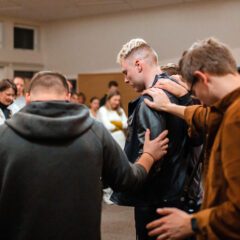While fifteen percent of the global population is disabled, religious communities and spaces around the world are replete with ableist barriers of all kinds, whether it’s a meditative pose that excludes certain bodies, a synagogue’s bimah only accessible by stairs or a Christian hymn that equates blindness with sin. Despite these setbacks, disabled leaders and allies have been advancing accessibility in their theology, worship practices and physical spaces. For many, accessibility isn’t just a matter of morality — it’s a spiritual duty. Religion News Service reported on how disabled and neurodivergent leaders across faith traditions are upending ableist assumptions and changing the religious landscape to be more hospitable to all.
The Jan. 6 attack on the U.S. Capitol resulted from a brew of political polarization and economic dislocation fueled by conspiracy theories and nationalist rhetoric. But the events of that day also marked a high tide of white Christian nationalism, a longstanding phenomenon in American religious and political history. In breaking news stories and commentaries following the attack, Religion News Service exposed how the insurrectionists’ violence was stoked by Christian “prophets” and a suspicion of government fostered by decades-long efforts to politicize evangelical Christianity using its own apocalyptic messages. Now RNS seeks to report on how the insurgents’ faith connections radicalized them and how faith leaders are responding to the Christian nationalism displayed at the Capitol riot. RNS also seeks to understand how other faith communities, Christian or not, have responded to the attack by supporting a vision of America as pluralistic, multicultural, and egalitarian. This investigation also would take into account other factors that led to the riot, including the pandemic, a severe recession, racial reckoning, and disruptions caused by technological, economic, and social changes that have left many feeling unmoored from the past, anxious about the present, and uncertain about the future. Through this grant, RNS will develop a series of stories that focus, in both print and multimedia, on houses of worship and their surrounding communities: Catholic, mainline Protestant, and Evangelical churches; mosques; temples; gurdwaras; synagogues, and other religious centers.
Around the world, women have been making notable advances in many realms, serving as heads of government, leading corporations and universities. Yet in several major religious denominations, women are barred or limited from serving as clergy and excluded from the uppermost leadership roles.



